We share the latest updated Microsoft AZ-220 test questions and answers for free, all test questions are real cracked, guaranteed to be true and effective! You can practice the test online! Or download the latest AZ-220 exam pdf.
The free exam questions are only part of what we share. If you want to get the complete Microsoft AZ-220 exam questions and answers, you can get them in leads4pass.
The leads4pass AZ-220 exam dumps contain VCE dumps and PDF dumps.
Microsoft AZ-220 Exam “Microsoft Azure IoT Developer” https://www.leads4pass.com/az-220.html (Total Questions: 93 Q&A)
Get part of AZ-220 pdf from leads4pass for free
Free share Microsoft AZ-220 exam PDF from Fulldumps provided by leads4pass
https://www.fulldumps.com/wp-content/uploads/2021/05/leads4pass-Microsoft-Azure-AZ-220-Exam-Dumps-Braindumps-PDF-VCE.pdf
Microsoft AZ-220 exam questions online practice test
QUESTION 1
You have an existing Azure IoT hub.
You need to connect physical IoT devices to the IoT hub.
You are connecting the devices through a firewall that allows only port 443 and port 80.
Which of following three communication protocols can you use? Each correct answer presents a complete solution.
NOTE: Each correct selection is worth one point.
A. HTTPS
B. MQTT
C. AMQP over WebSocket
D. MQTT over WebSocket
Correct Answer: ACD
QUESTION 2
You have an Azure IoT hub that uses a Device Provision Service instance.
You plan to deploy 100 IoT devices.
You need to confirm the identity of the devices by using the Device Provision Service.
Which three device attestation mechanisms can you use? Each correct answer presents a complete solution.
NOTE: Each correct selection is worth one point.
A. X.509 certificates
B. Trusted Platform Module (TPM) 2.0
C. Trusted Platform Module (TPM) 1.2
D. Symmetric key
E. Device Identity Composition Engine (DICE)
Correct Answer: ABD
The Device Provisioning Service supports the following forms of attestation:
X.509 certificates based on the standard X.509 certificate authentication flow.
Trusted Platform Module (TPM) based on a nonce challenge, using the TPM 2.0 standard for keys to present a signed
Shared Access Signature (SAS) token. This does not require a physical TPM on the device, but the service expects to
attest using the endorsement key per the TPM spec.
Symmetric Key based on shared access signature (SAS) Security tokens, which include a hashed signature and an
embedded expiration.
Reference: https://docs.microsoft.com/en-us/azure/iot-dps/concepts-service#attestation-mechanism
QUESTION 3
DRAG DROP
You have an Azure IoT solution that includes an Azure IoT hub.
You receive a root certification authority (CA) certificate from the security department at your company.
You need to configure the IoT hub to use the root CA certificate.
Which four actions should you perform in sequence? To answer, move the appropriate actions from the list of actions to
the answer area and arrange them in the correct order.
Select and Place: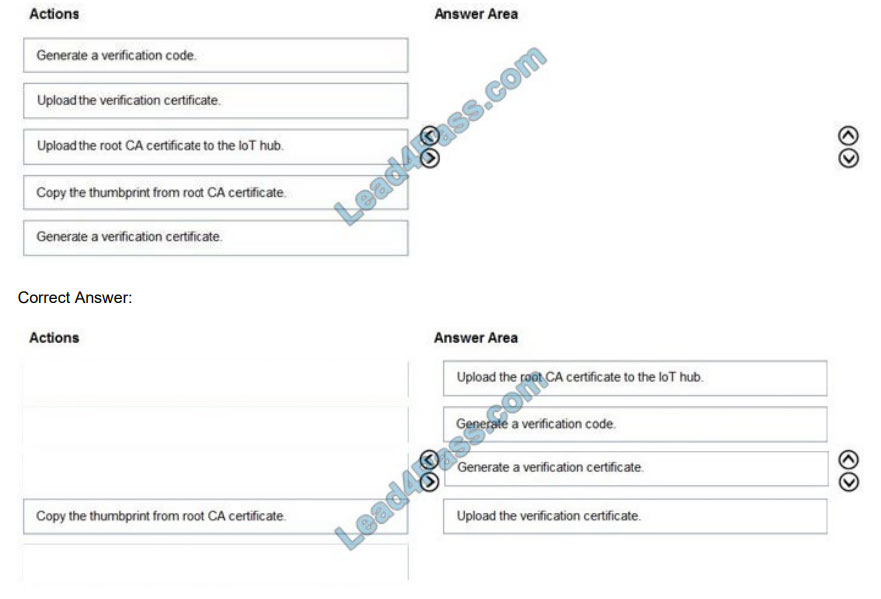
Reference: https://docs.microsoft.com/bs-latn-ba/azure/iot-hub/iot-hub-security-x509-get-started
QUESTION 4
You need to store the real-time alerts generated by Stream Analytics to meet the technical requirements. Which type of
Stream Analytics output should you configure?
A. Azure Blob storage
B. Microsoft Power BI
C. Azure Cosmos DB
D. Azure SQL Database
Correct Answer: A
When you create a Time Series Insights Preview pay-as-you-go (PAYG) SKU environment, you create two Azure
resources:
An Azure Storage general-purpose V1 blob account for cold data storage.
An Azure Time Series Insights Preview environment that can be configured for warm data storage.
Reference:
https://docs.microsoft.com/en-us/azure/time-series-insights/time-series-insights-update-storage-ingress
QUESTION 5
DRAG DROP
You have an Azure IoT solution that includes an Azure IoT hub, a Device Provisioning Service instance, and 1,000
connected IoT devices. The IoT devices are allocated to tour enrollment groups. Each enrollment group is configured to
use
certificate attestation.
You need to decommission all the devices in a single enrollment group and the enrollment group itself.
Which three actions should you perform in sequence? To answer, move the appropriate actions from the list of actions
to the answer area and arrange them in the correct order.
Select and Place: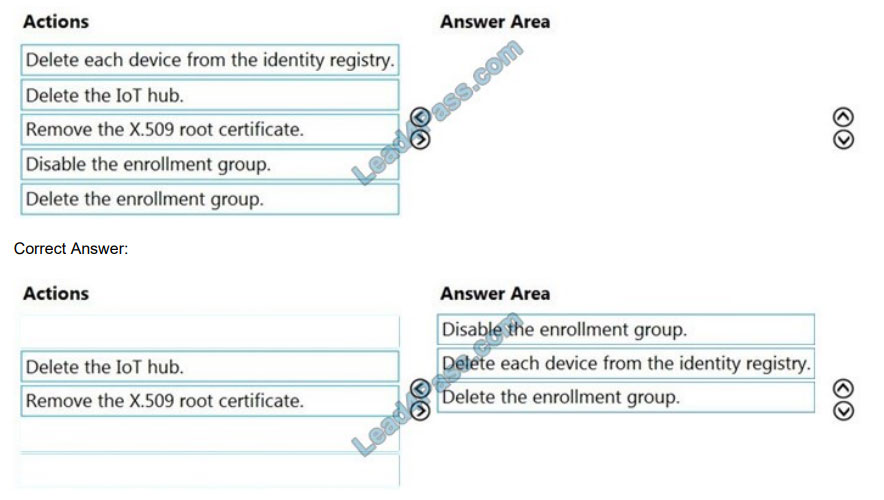
To deprovision all of the devices that have been provisioned through an enrollment group:
Disable the enrollment group to disallow its signing certificate.
Use the list of provisioned devices for that enrollment group to disable or delete each device from the identity registry of
its respective IoT hub.
After disabling or deleting all devices from their respective IoT hubs, you can optionally delete the enrollment group. Be
aware, though, that, if you delete the enrollment group and there is an enabled enrollment group for a signing certificate
higher up in the certificate chain of one or more of the devices, those devices can re-enroll.
Reference:
https://docs.microsoft.com/en-us/azure/iot-dps/how-to-unprovision-devices
QUESTION 6
You have a Standard tier Azure IoT hub and a fleet of IoT devices.
The devices connect to the IoT hub by using either Message Queuing Telemetry Transport (MQTT) or Advanced
Message Queuing Protocol (AMQP).
You need to send data to the IoT devices and each device must respond. Each device will require three minutes to
process the data and respond.
Solution: You update the twin desired property and check the corresponding reported property.
Does this meet the goal?
A. Yes
B. No
Correct Answer: A
IoT Hub provides three options for device apps to expose functionality to a back-end app:
Twin\\’s desired properties for long-running commands intended to put the device into a certain desired state. For
example, set the telemetry send interval to 30 minutes.
Direct methods for communications that require immediate confirmation of the result. Direct methods are often used for
interactive control of devices such as turning on a fan.
Cloud-to-device messages for one-way notifications to the device app.
Reference:
https://docs.microsoft.com/en-us/azure/iot-hub/iot-hub-devguide-c2d-guidance
QUESTION 7
HOTSPOT
You have the following device twin for the IoT device.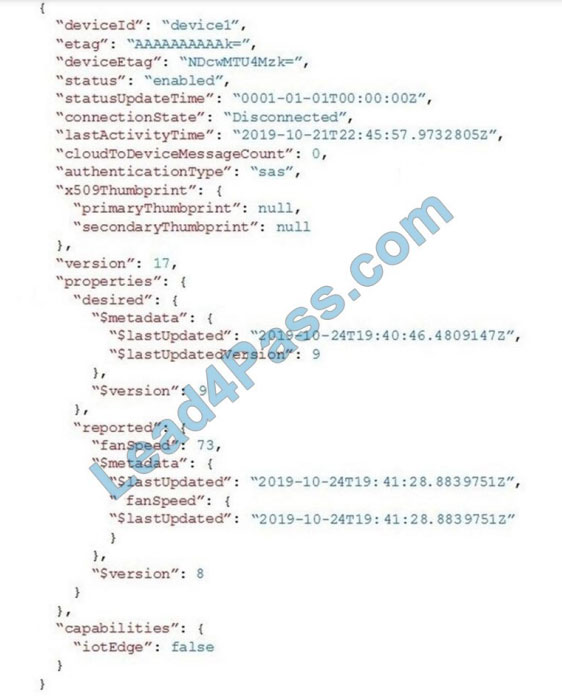
For each of the following statements, select Yes if the statement is true. Otherwise, select No. NOTE: Each correct
selection is worth one point.
Hot Area:
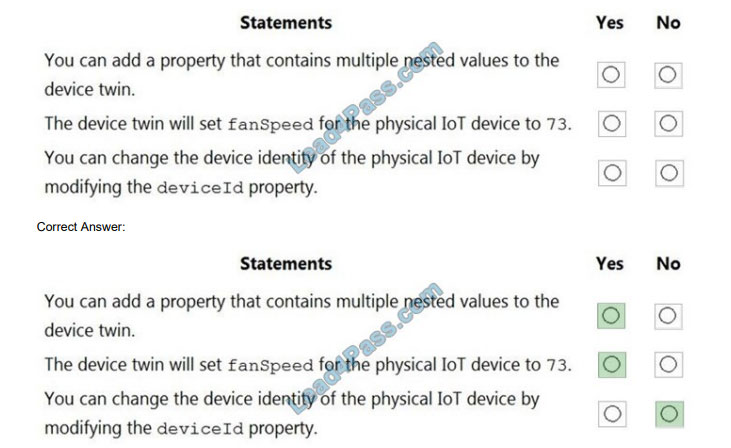
Box1: Yes
Box 2: Yes
Fanspeed 73 is a reported property.
Box 3: No
The deviceID property is read only.
Reference:
https://docs.microsoft.com/en-us/azure/iot-hub/iot-hub-devguide-device-twins
QUESTION 8
You have an Azure IoT solution that includes an Azure IoT hub, a Device Provisioning Service instance, and 1,000
connected IoT devices.
All the IoT devices are provisioned automatically by using one enrollment group.
You need to temporarily disable the IoT devices from the connecting to the IoT hub.
Solution: From the IoT hub, you change the credentials for the shared access policy of the IoT devices.
Does the solution meet the goal?
A. Yes
B. No
Correct Answer: B
Reference: https://docs.microsoft.com/bs-latn-ba/azure/iot-dps/how-to-unprovision-devices
QUESTION 9
You have an existing Azure IoT hub.
You use IoT Hub jobs to schedule long running tasks on connected devices.
Which two operations do the IoT Hub jobs support directly? Each correct answer presents a complete solution.
NOTE: Each correct selection is worth one point.
A. Trigger Azure functions.
B. Invoke direct methods.
C. Update desired properties.
D. Send cloud-to-device messages.
E. Disable IoT device registry entries.
Correct Answer: BC
Consider using jobs when you need to schedule and track progress any of the following activities on a set of devices:
Invoke direct methods Update desired properties Update tags
Reference: https://docs.microsoft.com/en-us/azure/iot-hub/iot-hub-devguide-jobs
QUESTION 10
HOTSPOT
You need to use message enrichment to add additional device information to messages sent from the IoT gateway
devices when the reported temperature exceeds a critical threshold.
How should you configure the enrich message values? To answer, select the appropriate options in the answer area.
NOTE: Each correct selection is worth one point.
Hot Area:
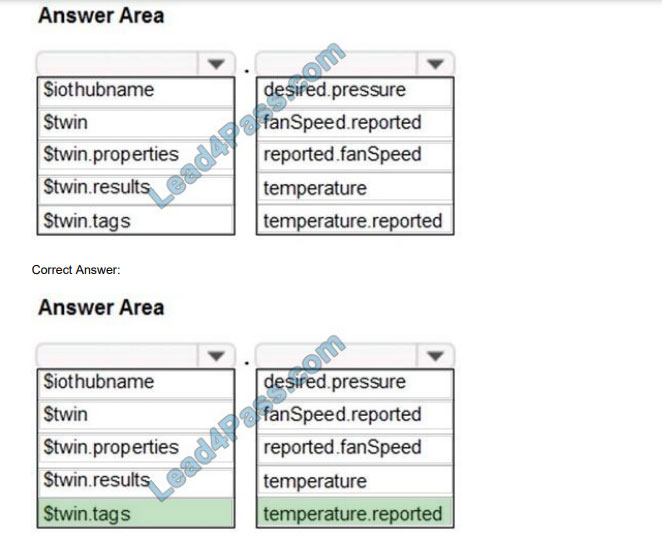
Reference: https://docs.microsoft.com/bs-cyrl-ba/azure/iot-hub/iot-hub-message-enrichments-overview
QUESTION 11
What should you do to identify the cause of the connectivity issues?
A. Send cloud-to-device messages to the IoT devices.
B. Use the heartbeat pattern to send messages from the IoT devices to iothub1.
C. Monitor the connection status of the device twin by using an Azure function.
D. Enable the collection of the Connections diagnostics logs and set up alerts for the connected devices count metric.
Correct Answer: D
Scenario: You discover connectivity issues between the IoT gateway devices and iothub1, which cause IoT devices to
lose connectivity and messages.
To log device connection events and errors, turn on diagnostics for IoT Hub. We recommend turning on these logs as
early as possible, because if diagnostic logs aren\\’t enabled, when device disconnects occur, you won\\’t have any
information to troubleshoot the problem with.
Step 1:
Sign in to the Azure portal.
Browse to your IoT hub.
Select Diagnostics settings.
Select Turn on diagnostics.
Enable Connections logs to be collected.
For easier analysis, turn on Send to Log Analytics (see pricing).
Step 2:
Set up alerts for device disconnect at scale
To get alerts when devices disconnect, configure alerts on the Connected devices (preview) metric.
Reference:
https://docs.microsoft.com/bs-cyrl-ba/azure/iot-hub/iot-hub-troubleshoot-connectivity
QUESTION 12
You use Azure Security Center in an Azure IoT solution.
You need to exclude some security events. The solution must minimize development effort.
What should you do?
A. Create an Azure function to filter security messages.
B. Add a configuration to the code of the physical IoT device.
C. Add configuration details to the device twin object.
D. Create an azureiotsecurity module twin and add configuration details to the module twin object.
Correct Answer: D
Properties related to every Azure Security Center for IoT security agent are located in the agent configuration object,
within the desired properties section, of the azureiotsecurity module.
To modify the configuration, create and modify this object inside the azureiotsecurity module twin identity.
Note: Azure Security Center for IoT\\’s security agent twin configuration object is a JSON format object. The
configuration object is a set of controllable properties that you can define to control the behavior of the agent.
These configurations help you customize the agent for each scenario required. For example, automatically excluding
some events, or keeping power consumption to a minimal level are possible by configuring these properties.
Reference:
https://docs.microsoft.com/en-us/azure/asc-for-iot/how-to-agent-configuration
QUESTION 13
You have an Azure Stream Analytics job that receives input from an Azure IoT hub and sends the outputs to Azure Blob
storage. The job has compatibility level 1.1 and six streaming units. You have the following query for the job.
You plan to increase the streaming unit count to 12.
You need to optimize the job to take advantage of the additional streaming units and increase the throughput.
Solution: You change the compatibility level of the job to 1.2.
Does this meet the goal?
A. Yes
B. No
Correct Answer: B
Max number of Streaming Units with one step and with no partitions is 6.
Reference: https://docs.microsoft.com/en-us/azure/stream-analytics/stream-analytics-parallelization
Thank you for reading! I have told you how to successfully pass the Microsoft AZ-220 exam.
You can choose: https://www.leads4pass.com/az-220.html to directly enter the AZ-220 Exam dumps channel! Get the key to successfully pass the exam!
Wish you happiness!
Get free Microsoft AZ-220 exam PDF online: https://www.fulldumps.com/wp-content/uploads/2021/05/leads4pass-Microsoft-Azure-AZ-220-Exam-Dumps-Braindumps-PDF-VCE.pdf

